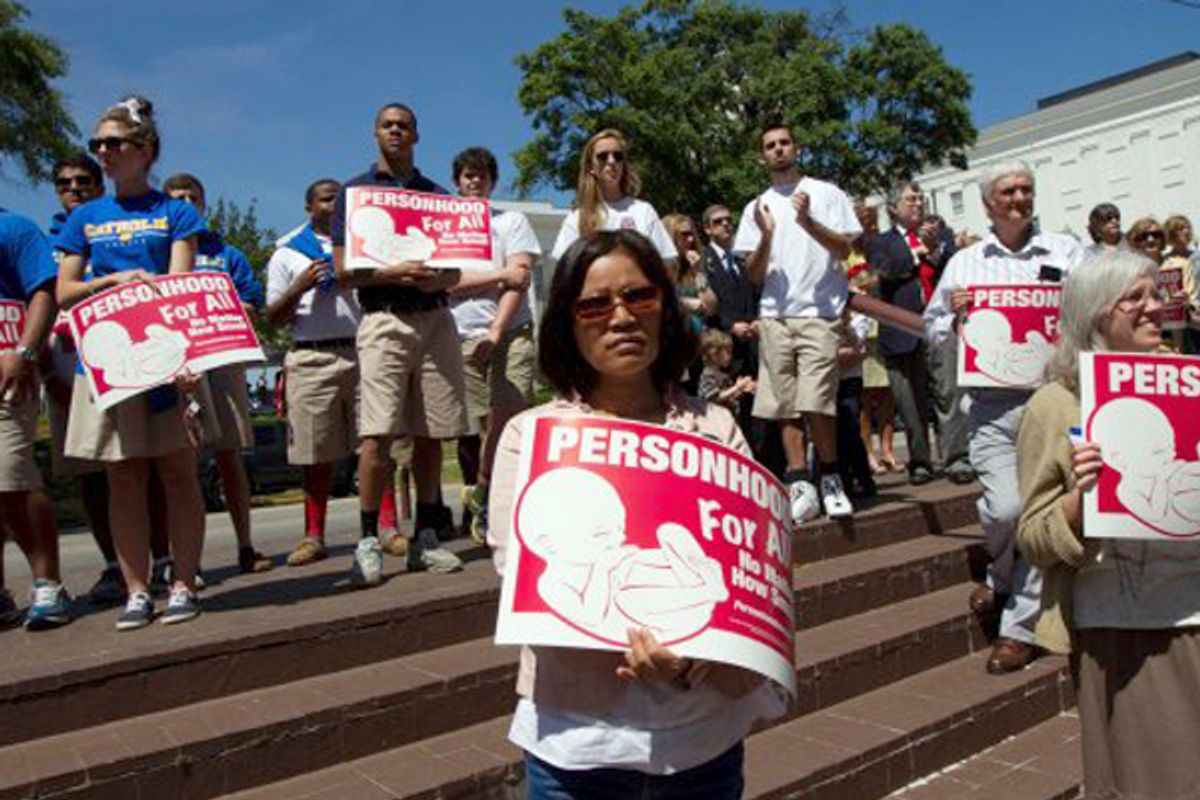You've probably heard about the personhood amendments being voted on today in both Colorado and North Dakota. You've also probably heard that Measure 1 in North Dakota stands a good chance of passing. If that happens, the state constitution would be amended to reflect an "inalienable right to life of every human being at any stage of development must be recognized and protected," and abortion, different forms of birth control and fertility treatments could be banned entirely.
Conservative supporters of the amendment have been trying to dodge the personhood label, but as Molly Redden at Mother Jones reported this week, the amendment's author, Republican state Sen. Margaret Sitte, didn't flinch at the language when she cribbed it from Wikipedia, or balk when Personhood USA joined her to celebrate the amendment passing in the state Legislature. Sitte and other supporters have also been clear that the intention of the amendment, as written, is to shutter North Dakota's last remaining clinic and challenge fetal viability as defined under Roe v. Wade.
In addition to cutting off access, these personhood amendments could expose people who need abortion care and doctors who provide that care to criminal penalties -- including incarceration. They could also exacerbate a problem that is already playing out in states across the country -- the criminalization of women for their pregnancy outcomes. A bizarre patchwork of laws have been used to arrest and detail women for miscarriages and drug use during pregnancy, fetal personhood only bolsters that effort. It's a frightening prospect, but personhood isn't the only reproductive justice issue on the ballot this year dealing with bodily autonomy and mass incarceration.
In California, Proposition 47, the "Safe Neighborhoods and Schools Act," would reduce six nonviolent offenses from felonies to misdemeanors, meaning that these crimes would be addressed, often enough, without prison time. It also means that people convicted of, say, possessing a small amount of certain drugs or shoplifting, won't have a felony conviction on their record, which can be a major barrier to employment and other basic things that help people move on with their lives.
Fighting mass incarceration benefits everyone, but, as Surina Khan pointed out recently in the Huffington Post, it would really help women and families, too. "Women are incarcerated for nonviolent crimes at disproportionate rates compared to men," Khan wrote. "For example, in California women are three times more likely to be in prison for forgery or fraud and twice as likely to be incarcerated for petty theft."
As Khan also notes, formerly incarcerated women are "less likely to obtain public benefits and find stable housing as they try to rebuild their lives." Women also struggle more than men to find employment after being incarcerated. So voting to support Proposition 47 is more than voting against a system of mass incarceration, it's voting to keep families together, to give women fair access to housing and employment and the ability to build stable homes for themselves and their families.
The list of reproductive justice on the ballot this year is long. Beyond state and federal races, voters will be deciding on raising the minimum wage in Alaska, Arkansas, Illinois, Nebraska and South Dakota. Tennessee wants its voters to further restrict abortion access in an already badly underserved state. All of this stuff matters. So while we continue to focus on the harrowing potential consequences of personhood in Colorado and North Dakota, it's important to keep in mind that the assault on reproductive freedom, on women and on families goes far beyond fetal rights.
Remember that today. Vote accordingly.

Shares